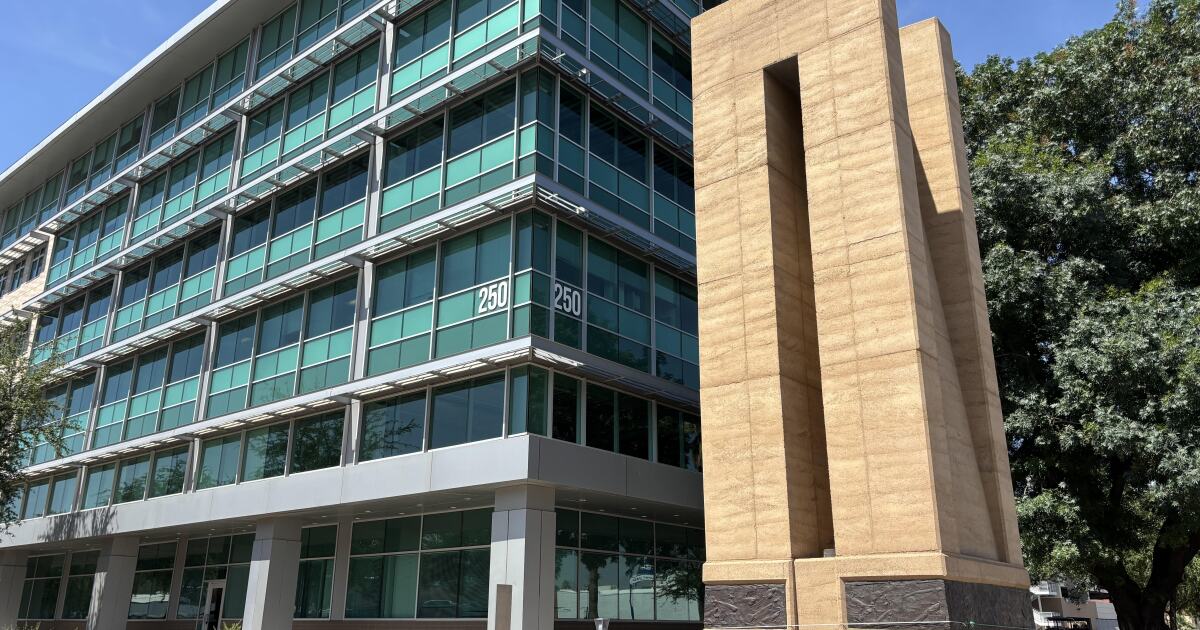A private security guard called Phoenix police on an immigrant-rights group handing out information at a federal immigration court in Phoenix, but officers declined to remove the activists, who argued they are engaging in constitutionally protected speech.
For months, volunteers have handed out small red cards to individuals who show up for their scheduled court date at the Phoenix Immigration Court, which is located within a private office complex in downtown Phoenix.
“We give people ‘know your rights’ cards so that they are aware of the rights they have in the United States, and then we go and silently observe the court cases,” said Beth Strano, executive director of the Borderlands Resource Initiative.
On Wednesday, volunteers were handing out those cards in a hallway where people wait in line to enter the court when a security guard at the Madison Square office complex told them they had to leave, Strano said.
The security guard did not call police after that incident, and volunteers returned later in the day to resume distributing information.
However, on Thursday morning, the security guard called Phoenix police to ask that Strano be removed from the property.
That came after the building management replaced signs prohibiting loitering with signs stating people could not distribute “handbills” in the building.
The city of Phoenix prohibits the distribution of “any commercial or noncommercial handbill’ on private property when there is a sign posted. The city code defines a noncommercial handbill as “any printed or written matter, any sample or other device, circular, leaflet, pamphlet, newspaper, magazine, paper, booklet or any other printed or otherwise reproduced original or copies of any matter of literature not included in the definition of a commercial handbill.”
But, after some deliberation, officers determined that the group could remain on site as long as they don’t wander around other parts of the private building or hand out information in the outside areas of the office complex, which also houses the Arizona Chamber of Commerce, the Arizona Office of Tourism and the Arizona Commerce Authority.
“If you’re in line … obviously official business, but don’t be wandering around the open area out there,” Detective Mike Hillman told Strano.
Strano said she did not believe the information cards qualified as “handbills.”
“There is protected speech around giving people ‘know your rights’ information, but we’re very careful not to cross the lines of what would be disruptive at all to the space,” she said.
This isn’t the first time security officers at the building have tried to remove protesters and activists.
In late May, security personnel and police officers warned journalists, protesters and activists they could be arrested for trespassing after they gathered at the office complex in response to reports that federal immigration agents were arresting people following their court hearings, the Arizona Republic reported.
ACLU Arizona later sent a cease-and-desist letter to Transwestern, the property manager, demanding they stop attempting to remove those people.
“Here, your office and city police have unquestionably retaliated against protestors and advocates in violation of their constitutional rights,” according to the June 25 letter. “Political expression, including protesting ICE’s courthouse arrests and the dissemination of Know-Your-Rights pamphlets, is protected speech and expression under the First Amendment.”
Unlike the U.S. district courts, immigration courts are a division of the federal executive branch and fall under the jurisdiction of the U.S. Department of Justice. They are still open to the public, with limited exceptions, according to the DOJ.
ACLU attorneys argued the private building is subject to constitutional protections, because it houses that federal agency.
“By your office’s housing of a federal administrative court, it has been granted a power exclusively reserved to the state … because of the leasing agreement between your building and the federal government for immigration court, there is a pervasive entwinement between your office and the state,” according to the letter.
A spokesperson for the Executive Office for Immigration Review, which includes the Phoenix Immigration Court, declined to say whether federal officials or the building owner requested that the activists be removed.
Representatives for Transwestern, as well as for Verus Holdings, the developer that owns the office complex, did not respond to requests for comment.
“The Executive Office for Immigration Review’s waiting room and/or hallways leading up to courtrooms is for parties to the proceedings or visitors who wish to observe an open hearing. Loitering or soliciting is not permitted in EOIR spaces,” Executive Office for Immigration Review spokeswoman Kathryn Mattingly said in an email.
Strano said volunteers with her group were not loitering or soliciting.
“We’re just there to give them the ‘know your rights’ information while we’re waiting to go in alongside them,” she said. “And then once the courthouse is open, we just do legal observation.”
John Mitchell, an attorney with ACLU Arizona, said the organization is still gathering facts about the situation to determine how to respond.
“It’s certainly on our radar,” he said.
